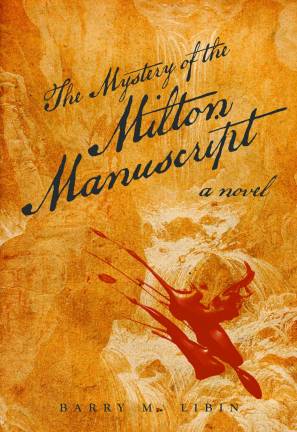Upper East Side author talks historical literature and thrillers Some authors have the ability to revisit a topic in literature and cause excitement about it once again. Upper East Side resident Barry Libin has done just that with his new novel, The Mystery of the Milton Manuscript. The thriller, which some are already dubbing the "Literary Da Vinci Code," takes on the search for Milton's lost manuscript in an effort to unveil the secrets of his timeless poem "Paradise Lost." To piece together this work of historical fiction, Libin, who himself is part of the esteemed Milton Society, researched for three and a half years, even taking a course on Milton at Yale. What made you write about "Paradise Lost?" Milton was, of course, a very unusual figure. If you believe in a God that's all merciful and all powerful, then how do you reconcile how tragedy can occur? It was really John Milton who wrote "Paradise Lost" to answer that question. He writes at the beginning that it's an attempt to reconcile those answers. More people have read "Paradise Lost" than any other poem in Western literature. What is the Milton manuscript? The mystery is what is contained in the Milton manuscript, that can be so controversial that it can cause a conspiracy to occur for 300 years. Because whoever gets close to finding the manuscript, which Milton, supposedly, has written, will actually get the real answer to what the book is about. What can you tell us about Milton? He was the most brilliant man in 17th century England and remains today one of the most pertinent and controversial figures in all of English history. He is as relevant today as he was in the 17th century. He was the one who told us that women and men should be allowed to divorce each other. Before that, if you didn't do exactly as Jesus said, which was that divorce should only be in case of rape or something, you were ostracized. Milton said, "What about if someone was simply uncomfortable or unhappy?" He was the first to proclaim that, and he was under a lot of criticism for that, actually. And he took that directly from the Old Testament, right from Deuteronomy. How did you do your research? I researched this of course by reading Milton's volumes. I even took a course at Yale just to review my Milton. It's three and a half years of research. In the book, the character researches at the New York Public Library. Well the New York Public Library, in 2009, celebrated the 400th anniversary of Milton's birth and had a huge program on that. I was able to find a tremendous amount of material at the public library. They had some wonderful things that they received from other museums and colleges in England. I read that you're a periodontist. What made you start writing? In 1995, I went into medical research. I've written scientific journals, plays, and musicals. I was a history and science major in college, so this really is an outgrowth of my interest in history. I'm writing my second historical novel because I find it fascinating. It's easier for people who have forgotten, since almost everyone has read something about Milton, to get back to him. I make it easy by putting it into an exciting mystery story. What kind of feedback have you gotten so far? If you go to Amazon, it's interesting to see the responses of people who have forgotten Milton and are going back to read "Paradise Lost" now. The responses are very, very interesting. What will your second historical fiction book be about? It has to do with Judeo-Roman history. At this point, I'm not allowed to say too much about it. You also wrote a play about the Triangle Shirtwaist Factory fire. It was performed in New York and now we're giving it to schools. We just recently had the 100th anniversary of the fire. So many people died because the owners locked the doors. The terrible thing was, when the fire came, people were on the eighth and ninth floors and the ladders only went up to the sixth. And so these young ladies who worked there, mainly Jewish, and some Italian, just jumped all the way down. To read more about Barry and his book, visit [www.miltonmanuscript.com](http://www.miltonmanuscript.com).

